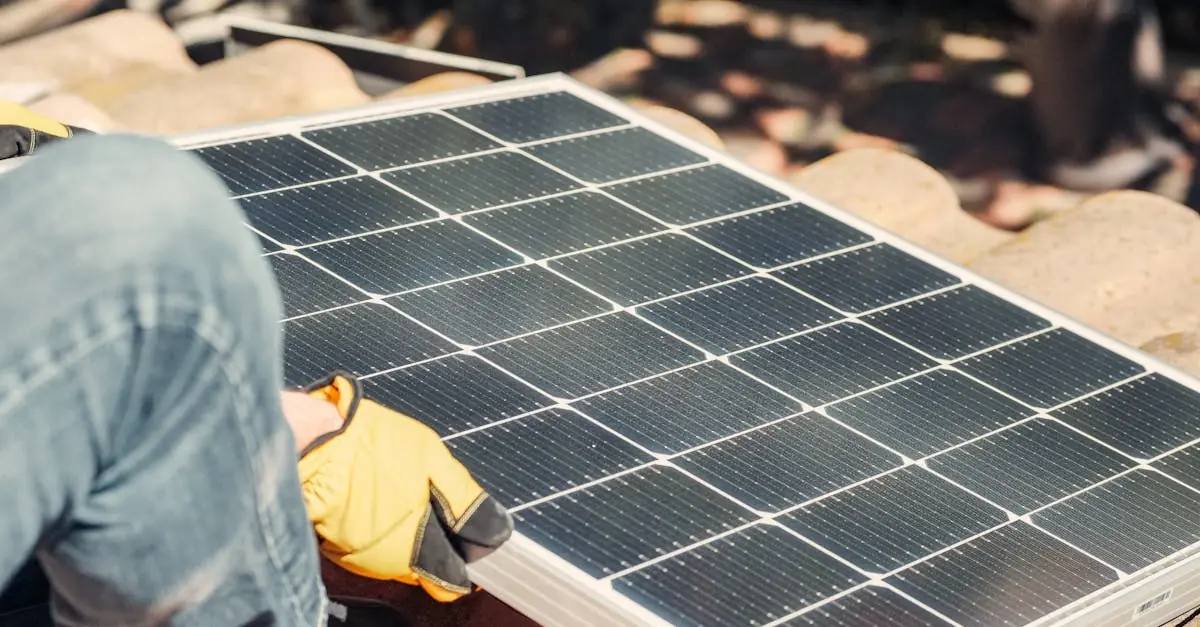In a world where energy bills can feel like a second mortgage, energy efficiency in housing isn’t just a buzzword; it’s a game-changer. Imagine living in a home that keeps you cozy in winter and cool in summer while saving you a chunk of change. Sounds like a dream, right? Well, it’s time to wake up and smell the savings!
Not only does energy efficiency help the planet, but it also puts more money in your pocket for the things you actually enjoy—like that fancy coffee machine you’ve been eyeing. From smart thermostats to energy-efficient appliances, the options are endless. So why not dive into the world of energy efficiency and discover how to turn your home into a lean, green, money-saving machine?
Table of Contents
ToggleUnderstanding Energy Efficiency In Housing
Energy efficiency in housing involves utilizing resources effectively to minimize energy consumption while maintaining comfort. This approach supports sustainability and can lead to noticeable savings on energy bills.
Definition Of Energy Efficiency
Energy efficiency refers to using less energy to perform the same function, such as heating or cooling a home. Energy-efficient homes often include features like superior insulation, advanced windows, and energy-efficient appliances. By optimizing energy use, homeowners can reduce waste and lower energy demand, making their living spaces more sustainable.
Importance Of Energy Efficiency In Housing
Energy efficiency significantly affects both the environment and household finances. Homes designed with energy efficiency in mind can cut energy bills by 30% or more. This reduction not only helps homeowners save money but also contributes to a decrease in greenhouse gas emissions, promoting environmental health. Furthermore, energy-efficient homes often attract higher resale values, making them a smart investment for property owners.
Benefits Of Energy Efficiency In Housing
Energy efficiency in housing provides numerous advantages, enhancing both financial and environmental well-being. Homeowners gain immediate benefits through reduced energy consumption and associated costs.
Cost Savings For Homeowners
Homeowners experience lower energy bills. Studies indicate that energy-efficient homes can reduce costs by 30% or more. Investments in insulation and high-performance windows lead to significant long-term savings. Energy-efficient appliances minimize electricity usage, further improving overall expenses. With these savings, property owners can allocate funds to other important areas, enhancing their quality of life.
Environmental Impact
Environmental health improves through energy-efficient housing. Reduced energy consumption leads to lower greenhouse gas emissions. Homes designed for efficiency contribute to a decrease in reliance on fossil fuels. Promoting sustainability, energy-efficient homes support cleaner air and water. Communities benefit from a collective reduction in carbon footprints, highlighting the importance of energy efficiency for the planet’s future.
Strategies For Improving Energy Efficiency In Housing
Improving energy efficiency in housing creates comfort and drives down utility costs. Several strategies exist to enhance residential energy performance.
Insulation Techniques
Effective insulation techniques prevent heat loss during winter and minimize heat gain in summer. Spray foam insulation, fiberglass batting, and blown-in cellulose are popular choices. Attic insulation contributes significantly to overall efficiency, often reducing energy bills by up to 20%. Sealing gaps around windows and doors further tightens the envelope, enhancing thermal performance. Proper insulation not only lowers costs but also boosts indoor air quality.
Energy-Efficient Appliances
Selecting energy-efficient appliances is crucial for reducing electricity consumption. Energy Star-rated products consume less energy while providing the same functionality as standard appliances. Refrigerators, washing machines, and dishwashers are key areas where upgrades yield noticeable savings. Homeowners can see savings of 10% to 50% on their energy bills with these high-efficiency alternatives. Smart appliances offer additional benefits, allowing users to monitor and control energy use remotely.
Renewable Energy Sources
Incorporating renewable energy sources significantly enhances energy efficiency. Solar panels convert sunlight into usable electricity, often lowering energy costs and increasing home value. Wind turbines, where applicable, offer another renewable energy option. Utilizing these resources can lead to substantial reductions in greenhouse gas emissions. According to recent data, homes with renewable energy systems can achieve up to 100% energy independence, promoting long-term sustainability.
Challenges In Implementing Energy Efficiency
Implementing energy efficiency in housing faces various challenges that can impede progress.
Financial Barriers
Financial constraints often hinder homeowners from investing in energy-efficient upgrades. Many home improvement projects, like installing advanced insulation or energy-efficient windows, require significant upfront costs. Budget limitations prevent many individuals from pursuing these essential upgrades, even though they offer long-term savings. Additionally, homeowners may struggle to secure financing or grants for such improvements. Without adequate funding options, implementing energy-efficient solutions becomes less appealing, even when potential energy bill reductions exceed 30%. Awareness of available financial incentives can help alleviate some of these barriers.
Awareness And Education
Lack of awareness remains a significant obstacle in adopting energy efficiency measures. Many homeowners do not understand the benefits of energy-efficient technologies and the impact these can have on their energy bills. Educational initiatives are crucial in informing individuals about options like smart thermostats and Energy Star appliances. Improved understanding can motivate homeowners to make informed decisions, leading to greater demand for energy-efficient housing. Furthermore, communities can benefit from workshops and informational campaigns that promote energy efficiency as a means of reducing overall consumption. Increased knowledge can drive positive change towards sustainable living.
Future Trends In Energy Efficiency In Housing
Innovations continue to shape energy efficiency in housing. New building materials focus on enhancing insulation and reducing energy needs.
Innovations In Building Materials
Sustainable materials, such as bamboo and recycled steel, promote energy efficiency in housing. Advanced insulation options, like aerogel and vacuum insulation panels, improve thermal performance significantly. Structural insulated panels minimize energy loss while speeding up construction. Smart glass, which adjusts its tint according to light levels, reduces reliance on artificial lighting and heating. Manufacturers also explore biodegradable materials, aligning with environmental goals. All these innovations contribute to lower energy consumption and support the growing demand for eco-friendly homes.
Smart Home Technology
Smart home technology enhances energy efficiency through automation and monitoring. Smart thermostats optimize heating and cooling schedules, adapting to occupants’ habits. Energy management systems give homeowners real-time insights into energy usage, enabling informed decisions. Smart lighting adjusts based on occupancy and natural light, reducing electricity waste. Homeowners can remotely control appliances, ensuring they only operate when needed. Integrating renewable energy sources with smart technology maximizes resource utilization. As this technology advances, energy-efficient living will become more accessible, supporting sustainable housing initiatives.
Energy efficiency in housing stands as a vital component for both financial savings and environmental sustainability. By investing in energy-efficient upgrades homeowners not only enhance their living spaces but also contribute to a healthier planet. The benefits extend beyond immediate cost reductions to include increased property values and improved quality of life.
As technology continues to evolve innovative solutions make it easier than ever to adopt energy-efficient practices. Homeowners are encouraged to explore available options and stay informed about advancements in the field. Embracing energy efficiency isn’t just a choice; it’s a commitment to a more sustainable future for everyone.







